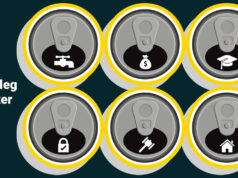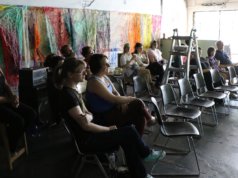
We in Oklahoma deal with a lot of reality that is hard to understand. Our history and culture pushes people to hold their pain inside. This suffering contributes greatly to Trumpism, and, even if it isn’t easy, we need to listen without judging. Fortunately, the art scene in Oklahoma City makes it easier to wrestle with our deepest feelings.
The Real Life Test documents life of trans person in OKC
What a wonderful time film fans had in July in Oklahoma City. It started off July 21 at the Individual Artists of Oklahoma screening of The Real Life Test, a film about Paula Sophia Schonauer (see trailer above). Director Peter Hermes documents her life as an athlete, soldier, police officer and writer. He also captures “her children, her faith, her career, and ultimately her run for public office.” Schonauer was nearly was elected in Oklahoma as the nation’s first transgender legislator. According to a post about the event, the film,
“… is an intimate look at Paula Sophia’s life. From adversary to triumphs and everything in-between. The Real Life Test is part biography, part call-to-action, and a reminder to always live your truth.”
docLahoma Film Festival presents eclectic mix
The next day, across Sheridan Avenue, the third docLahoma Film Festival was held at the Paramount on Film Row. Among the eclectic short- and medium-length films were celebrations of organic agriculture, “dragtivists” (transgender activists) and widowed lesbians. The fest also featured a humorous response to political correctness and outlined the danger that “trigger warnings” on today’s campuses can devolve into censorship. There was also an irreverent celebration of the production of a “bizarre softcore porn film called Fongaluli” in 1972.
A more serious series of films included Rural, which explored the lives and political beliefs of Trump voters in White Hall, Illinois. Also, 6th Graders School Roy Moore’s Attorney shared children’s wisdom on the anti-intellectual side of Trump’s populism. The Providers then documented a holistic health provider experiment in battling chronic illness and “deaths by despair” in the type of rural area (in New Mexico) that has fed Trumpism.
Film featuring Javier Bardem stands out
https://www.youtube.com/watch?v=wTmYWk7kerU
All of the docLahoma films and discussions were terrific, but Eugene Richards’ Thy Kingdom Come, which was also premiered at South by Southwest in March, stands out. It is a “pseudo-documentary” created with footage of Javier Bardem’s character Father Quintana from Terrence Malick’s 2012 film, To The Wonder. When filming people in Oklahoma’s Osage County, Richards explained that Bardem (who starred as the bad guy in No Country for Old Men) was not a real priest, but he was there to listen and understand, not to judge. The filmmaker let the camera run as he asked people to say something about their lives. As this trailer says, what we see here is reality.
A mother recounts how one of her children drowned as she slept after an excessively long night shift at work. Another woman described her experiences of being sexually assaulted. Battles with obesity, cancer, drugs and unemployment are described. Without commentary, the longing for personal connections and the search for a meaning in life are documented.
Being in Oklahoma, incarceration plays a prominent role. The New Yorker emphasized:
A former Ku Klux Klan leader tells Bardem about his decision to renounce his racist past. At Osage County Jail, Bardem asks a taciturn black inmate what he should do with his half-smoked cigarette. The inmate replies, “Put it on the floor and stomp it out. That’s what they did to me. Put me on the floor and stomped me out. Just that easy.”
Another art gallery screening
On July 26 at Artspace at Untitled, staff continued their tradition of viewing and discussing short films. Five films provided European perspectives on racial discrimination, sexual assault, the quandaries facing immigrants, generational tensions, disruptive digital technologies and conflicts between life in an increasing tribal society where social bonds are fraying. In contrast to most of the audience, my favorite was Epic Fail by Greg Barth. It portrayed “breaking news” in which a United Nations resolution to bring about world peace seemed to be on track to receive a big majority vote — until social media did its thing.
Contemporary history continues to inspire auteurs
Oklahoma has a long experience with tragic social problems that have prompted extreme political action as well as inspired outstanding artists. Contemporary history hasn’t let us down in terms of providing material for great struggles and excellent dramatic performances. I suspect Oklahoma City’s great week of films foreshadows even more greatness.




















